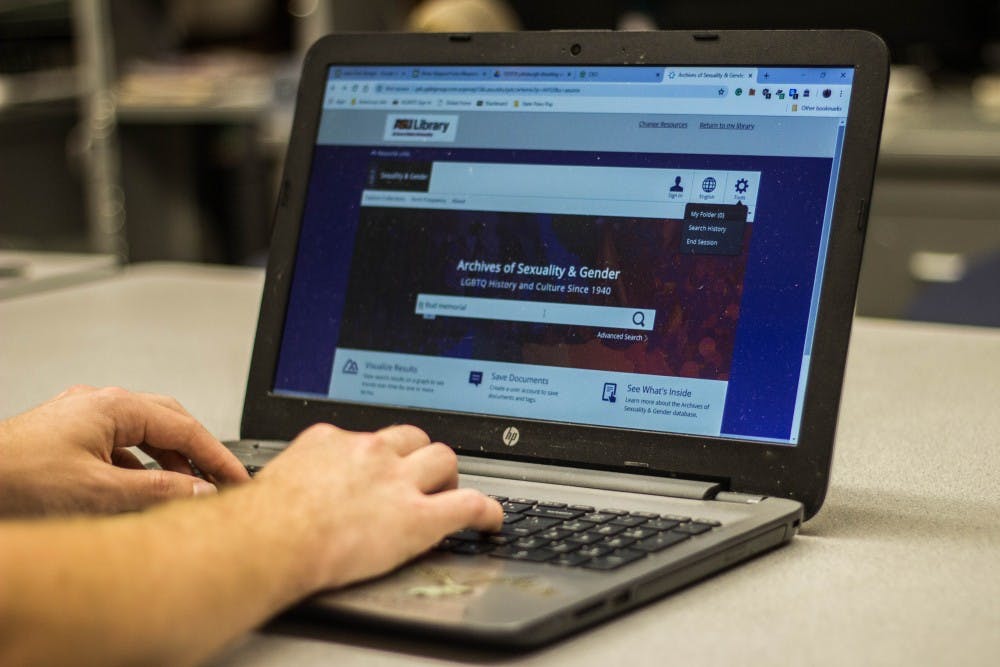In innovative fashion, ASU archivists are working to scan photographs and periodicals from Arizona’s LGBT+ history and upload them online.
Until now, the Bj Bud Memorial Archives, Arizona’s largest collection of LGBT+ history, have only been accessible to the public on ASU's Tempe campus. An online catalog exists to detail what is included in the collection, but now the records themselves will be available online.
Read more: ASU library collaborates with Phoenix Pride to demonstrate LGBT history
Archivists began to scan and upload pieces from the collection this past February. While a portion of the archives are already uploaded, it won’t be until December that the 10,000+ images and periodicals are fully accessible to the public.
The project behind the uploads, called “Engaging, Educating, and Empowering: Developing Community-Driven Archival Collections,” was made possible after the Andrew W. Mellon Foundation provided ASU a $450,000 grant.
Nancy Godoy, an assistant archivist at ASU and the project's lead, said the project is unique on a national level because it works to educate and train community members to preserve history. The project does so by providing archival supplies, offering workshops and scanning materials for community members. She said there are no workshops planned yet, and that she is relying on organizations such as Phoenix Pride to sponsor such events in the future.
“There's still so much work to do, and that's why we're hoping the community can see what we have and then help fill in the blanks,” Godoy said.
Godoy said that although the collection includes as much of Arizona's LGBT+ history as possible, it aims to be more inclusive by sharing the history of minorities within the LGBT+ community.
“Even though it’s named after a lesbian activist, the collection is very gay, white-male dominated,” Godoy said. “And so we need to make sure we include the voices of minority groups within historically marginalized communities as well.”
Along with scanning photographs and periodicals, the project is also compiling and uploading audio interviews with people who can share Arizona’s unrecorded LGBT+ history and is considering uploading videos as well.
Marshall Shore, Phoenix's "hip historian” and project manager for the Arizona LGBT+ History Project, said the interviews are important because they share the oral history of Arizona’s LGBT+ community that would otherwise be lost.
“We really only have gay periodicals since the mid '70s,” Shore said. “So anything before that winds up being oral history because there's no other way for it to exist.”
Shore said it’s important to record oral history as quickly as possible because many of the people who can tell it are aging.
“Bill Laybourne recently passed away, and in the early '70s, he was instrumental in getting gay culture kickstarted here in Arizona,” Shore said. “He just passed away about a month or two ago, and we were able to do an oral history with him about two weeks before he passed.”
Shore said it’s essential to preserve Arizona's LGBT+ history because many people aren't aware it exists.
“Just realizing that the Southwest and Arizona do have a queer history — that's actually quite important in terms of the overall country,” Shore said.
As the archives continue to grow, Shore said it’s important for the community to realize that people are the best source of information.
“We want people to realize there's going to be these really great resources up online, and that there's the opportunity to add more to it as well,” he said.
Anali Perry, scholarly communication librarian for the ASU Library, worked with Godoy and other archivists to determine which materials in the collection had copyright barriers that might hinder uploading.
“With the Bj Bud Memorial Archives, these are voices that have traditionally been erased or not paid attention to,” she said. “And when you don't have access to these people's lived experiences, it's easy to continue to view them as being other, or not mainstream, or not worth paying attention to.”
She said part of her work focuses on advocating for equitable access to information, and that uploading the Bj Bud Memorial Archives plays an important role in making more people aware of the history of LGBT+ people.
"Having audio recordings of people talking or of people singing is always more powerful, and it speaks to us as humans," Perry said.
She said an important part of these archives going digital and interviews and videos being included is so people can see a face and name attached to the history.
"You have actual people that you can relate to and see that these are people that lived and existed and laughed and played and cried, just like I do," Perry said. "And it makes that very real human connection."
Reach the reporter at jkbeneve@asu.edu and follow @JacobBenevento on Twitter.
Like The State Press on Facebook and follow @statepress on Twitter.




